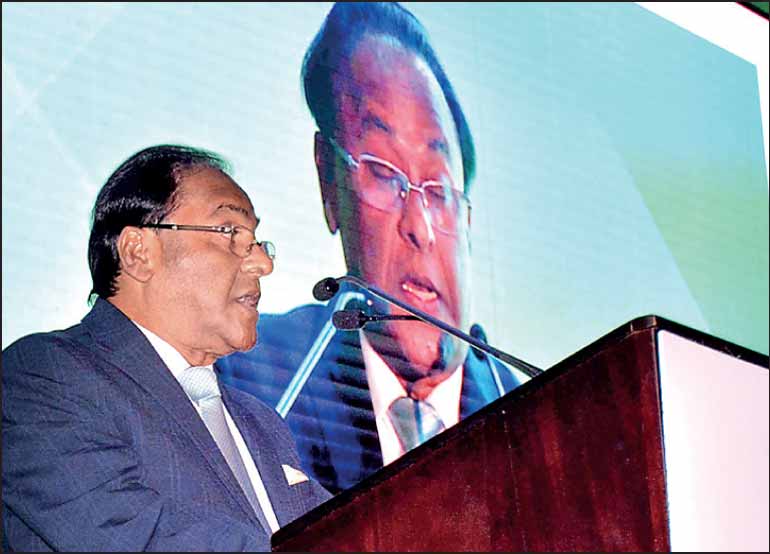Sunday Feb 15, 2026
Sunday Feb 15, 2026
Saturday, 30 November 2024 00:04 - - {{hitsCtrl.values.hits}}

THASL President M. Shanthikumar
The Hotels Assoc-iation of Sri Lanka (THASL) President M. Shanth-ikumar on Thursday delivered a candid assessment of the country’s tourism sector at the association’s 59th anniversary celebrations.
Addressing policymakers and industry stakeholders, he emphasised the vital role of hotels in the tourism industry, whilst calling for immediate policy interventions to address pressing challenges.
“The tourism industry needs new robust policies to be adopted. The same old models on books may not work,” he cautioned, urging the Government to adopt innovative financial and development strategies to revive the industry.
Shanthikumar underscored the substantial economic contributions of the hotel sector, noting
$ 15 billion investments in infrastructure and employment of 70% of the tourism workforce. He highlighted the industry’s role as the second-largest net foreign exchange earner, surpassing apparel, and stressed its far-reaching benefits from grassroots communities to Government coffers.
“Our members continue to spend over Rs. 3 billion annually for overseas marketing and promotions.
This is in addition to the Tourism Development Levy (TDL). Further, billions of rupees are spent to maintain hotel plants, for continuous training of staff, and for day-to-day operations,” he explained.
Noting that the sector faced unprecedented challenges over the past five years from Easter attacks in 2019 to the COVID-19 pandemic and the economic crisis, he said the industry is still struggling to recover completely.
The THASL President urged the Government to grant export status to the tourism industry, citing its ability to generate significant foreign exchange and its high multiplier effect on the local economy.
“We seek your support to award tourism export status which would benefit the industry and its stakeholders tremendously,” he appealed.
Shanthikumar expressed optimism in the industry’s potential to achieve the $ 10 billion revenue in the coming years if strategically handled.
He also called for stricter regulation of the informal accommodation sector, which he estimated to rival the formal sector in room numbers. He insisted that proper licencing, safety standards, and tax compliance were highlighted as essential steps to level the playing field. . “The SME sector plays a critical role and so does the informal sector, which we estimate has almost the same number of rooms as the formal sector. These require to be regulated to ensure they have the proper health and safety guidelines, SLTDA licence, and fall into the tax net,” he added.
The THASL President also criticised the recent increase in liquor licence fees and turnover-based taxes as unfair burdens on hoteliers. Shanthikumar pointed out the disparity in tax treatment between hotels and other high-earning industries.
“The local Government authorities are demanding hotels to pay a further 1% tax on turnover, whilst all other industries, such as banks, hospitals, super markets, and apparel, only pay Rs. 6,000 per annum. These industries record much higher earnings than hotels. Thus, hotels too must pay the same rate as all other industries. This has been a burning issue for the hotel industry for over 10 years and over 200 legal cases are pending. Why is an industry with such high forex earnings being penalised and discriminated against?” he argued, urging Tourism Minister Vijitha Herath who was sitting in the audience to pay attention in this regard.
He also flagged the acute shortage of skilled and unskilled workers in the hospitality sector, proposing the Sri Lanka Institute of Tourism and Hotel Management (SLITHM) to prioritise large-scale targeted training programs, particularly for women and youth in rural areas.
“We are experiencing a severe dearth of skilled and unskilled staff at all levels. With hotels being located across the country, there is great opportunity for trained youth and females to get jobs nearby to their villages or hometowns. The female workforce in hospitality in Sri Lanka is still far below regional levels. Hence, there is a need to develop the necessary human capital in large numbers on a priority basis and to reorganise the SLITHM to churn out the much-needed hotel sector staff by training the youth to fit into the hospitality industry,” he added.
With no global tourism campaign in 15 years, the lack of effective marketing was identified by Shanthikumar as a major hindrance.
“We have seen in the past that to plan and roll out a new campaign takes a very long time. Time is of essence if we are to achieve the proposed arrival targets. Competing destinations such as the Maldives, Vietnam, Thailand, and Malaysia are carrying out very effective campaigns in key source markets,” he stressed, calling on the Tourism Minister’s support to get the campaign out immediately.
The THASL President called for the establishment of an inter-ministerial committee, led by the President, to ensure coordinated decision-making across the 18 Ministries linked to tourism activities.
Shanthikumar commended the efforts of the new Tourism Minister and Sri Lanka Tourism Development Authority (SLTDA) Chairman Buddhika Hewawasam, whilst stressing the need for comprehensive and sustainable policy work.